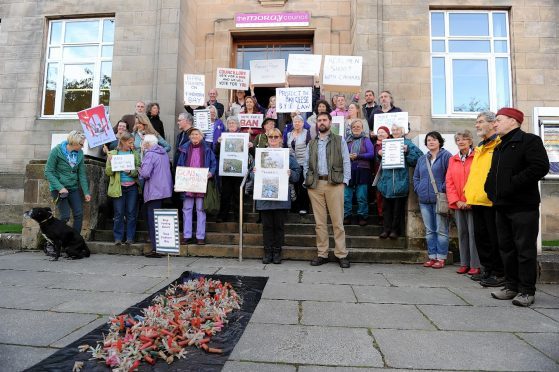Moray Council has sparked fury among protestors who are demanding a ban on shooting at Findhorn Bay.
Around 40 campaigners gathered outside the authority’s Elgin headquarters yesterday to urge elected members to outlaw the practice at the nature reserve.
They laid out hundreds of spent cartridges, found around the bay, and waved placards bearing slogans such as “stop fowling nature”.
They even displayed grisly images of dead geese, killed over Moray, on the steps of the High Street building.
But the images were not enough to convince members of the economic development and infrastructure services committee to prohibit the traditional pastime.
Instead, councillors voted to leave it to the committee which oversees the reserve to find a solution which might satisfy both parties.
Committee chairman, John Cowe, said he hoped a strategy could be devised within months, at which time councillors could investigate proceeding with a by-law, safe in the knowledge that its conditions would not be contested.
However, members of the Friends of Findhorn Bay protest group were left “angry and incredulous” at the decision.
Group co-convener, Louis Bezuidenhout, said he feared the committee overseeing the reserve would “lean towards the interests of the shooters”.
Lead petitioner Lisa Mead added: “We are aghast at the council’s refusal to take responsibility for this matter.
“We do not understand how the unfunded, voluntary and unelected nature reserve management committee is supposed to broker a deal between all interested parties.”
Local authority officers had suggested that shooting could be banned at a stretch of council-owned coastline known locally as “cowboy corner”, in an effort to ease tensions between the warring factions.
But Mr Cowe added he believed the best option was to arrange “a compromise that all stakeholders can support”.
He said: “It is clear emotions are high, and those with an interest are passionate about what happens at the reserve.”
After the meeting, wildfowler Willy Miller said he agreed with the terms of an agreement previously forged between his members and the protestors – which restricted hunting to certain times of the day and parts of the bay.
